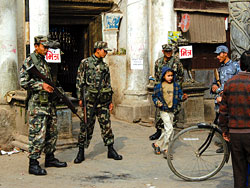|
|
Irrespective of the regime and its aims, elections are a big-ticket expenditure for the state exchequer and a drain on the economy. In developing nations like ours where 'real' literacy levels are low, elections seems to revolve more around money than any purpose. Luckily, this week's election did not include many parties doling out money to buy votes but the costs remain the same.
Holding elections entails both tangible and intangible costs. For instance, for these local elections the government had to spend more to make citizens aware of the voting process and their voting rights than in previous years since there were more parties opposing the polls. Getting the ballot boxes to polling stations, printing ballot papers and other costs of running the elections are also significant. Security costs in the current environment have obviously been high-in an effort to conduct free and fair elections the government had no choice but to beef up security.
The display of armoured personnel carriers and other bandobast during bandas in the streets of Kathmandu perhaps does give some candidates and voters a sense of security but these vehicles unfortunately run on scare petroleum products that regrettably do not come free. Perhaps the saddest issue is that citizens will never know the actual price-tag of this election, as security expenses, the largest cost, cannot be disclosed in the national interest.
Then there are the intangibles. The government will be shut for a week as people do election duty, meaning public servants will not be available to the public. Educational institutions, including universities, are shut so students lose out. A day of national productivity goes by the wayside, out of the very few productive days that remain in our annual calendar. Add to that the cost of the Maoist-declared week-long shutdown and the costs are incalculable.
It is unknown how long these elected representatives will remain in office. If they start resigning soon after being elected, the process of by-elections will have to be initiated. Despite Wednesday's elections, many more seats need to be filled, so more money will be spent.
Political decision-making requires economic introspection, especially in an economy that is stagnating. It is the right of the taxpayer to see that the portion of the hard-earned money that has been taken by the state goes to provide the services that the state should supply. Continuous channelling of taxpayers' money for unintended purposes never makes taxpayers happy.
www.arthabeed.com




